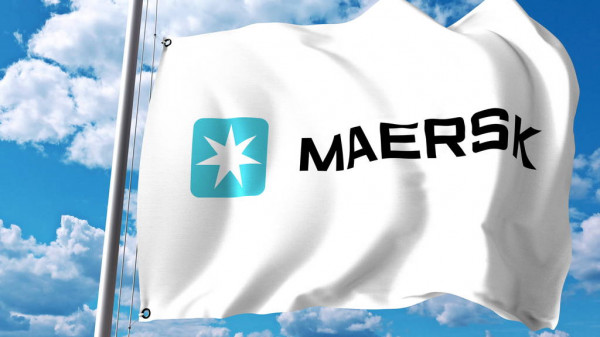A.P. Moller – Maersk A/S (Maersk), and China Classification Society (CCS) are set to embark on a major project to drive decarbonisation in the shipping industry after signing a landmark agreement in Beijing.
The framework agreement signed at CCS’ headquarters will kickstart research between Chinese and European enterprises and institutions aiming to speed up decarbonisation in shipping.
The agreement was signed by Sun Feng, CCS Vice President, and Jens Eskelund, Managing Director of Maersk China Limited on behalf of CCS and Maersk, witnessed on site by H.E. Thomas Østrup Møller, Danish Ambassador to China, Klaus Rostell, Danish Maritime Counsellor to China, Mo Jianhui, CCS Chairman and President, and via video link by Ole Graa Jakobsen, Head of Maersk fleet technology, and Morten Bo Christiansen, Head of Maersk decarbonization in Copenhagen. Delegates from relevant enterprises, research institutes and universities also attended the ceremony.
Mo Jianhui said: “Maersk is already a front runner in energy efficiency and decarbonisation. By joining hands with Maersk, I believe we can develop the right set of standards, rules, and technical solutions for the benefit of the whole industry. We believe that open-minded discussions and trusted partnerships are key to make that happen, which will also contribute to China’s ambition of realizing the pledge of reaching peak emissions before 2030 and carbon neutrality before 2060.”
Jens Eskelund said: “Maersk has set a clear and ambitious goal to become carbon neutral by 2050. China, as a globally leading maritime and shipbuilding nation, will be a crucial partner towards ensuring that our industry will be able to respond effectively to the climate change challenge. We are very pleased to join hands with CCS to collaborate on carbon-neutral technologies and standards and explore the opportunities for international cooperation within sustainable and zero carbon shipping.”
Ole Graa Jakobsen said: “Maersk and CCS already have an established partnership. The extension of cooperation to research of green fuels and vessel development is adding a new and exciting dimension to our partnership. By leveraging CCS’ research capabilities, we believe we will have access to a broader range of high quality resources to enable our journey towards a zero carbon future.”
Ambassador Thomas Østrup Møller said: “Maritime decarbonisation can only be achieved successfully through strong international cooperation and exchange of knowledge. New technologies need to be developed in order to ensure carbon neutrality. Developing and implementing entirely new maritime propulsion technologies and fuels requires international collaboration, due to the scale and urgency of the challenge.”
Mr Jianhui said the agreement will see in-depth research undertaken on feasible decarbonisation pathways, innovative technologies and different ship types focusing on the direction of future energy development. He said three expert groups will be established to carry out research on risk assessment and regulation development, life-cycle greenhouse gas emissions, and the sustainability and availability of marine alternative fuels examining the development of methanol and ammonia fueled container ships. Where appropriate, the participants will jointly apply for Sino-Danish inter-governmental science and technology innovation cooperation project.
Maersk CCS decarbonisation agreement
Maersk said it is committed to proactively exploring feasible solutions for emission reduction of ships engaging in international voyages, and is seeking to develop and apply new propulsion technologies and carbon-neutral fuels for ships. CCS said it is working together with the industry to study and explore the pathways to carbon emissions peak and neutrality, saying it is making rapid progress on innovative technologies for shipping GHG emission reduction, the development of relevant rules and standards, as well as research into ships using alternative fuels. In the upcoming joint research, CCS will utilize its technical strength to promote cooperation among all parties to produce impactful results.
All participating parties agree that collaboration is key to the decision-making process of researching low and zero-carbon energy used in shipping. As global shipping leaders, China and Europe should enhance cooperation to facilitate cross-sector innovation and knowledge sharing. The partnership of such kind will become a good example of collaboration across the industry to jointly explore the pathway to a net-zero future for shipping, and send a positive message to shipping and ultimately global decarbonization.
CCS background
Founded in 1956, China Classification Society (CCS) is headquartered in Beijing and is a full member of the International Association of Classification Societies (IACS).
• CCS is the world’s fastest growing classification society.
• Its serviced fleet numbers more than 32,000 vessels exceeding 171.80million GT.
• Its ship survey business covers large ore carriers, high value-added ships including container ships and liquefied natural gas (LNG) carriers, and green and intelligent ships. CCS also provides classification services to a vast range of offshore installations and related industrial products.
• CCS has a worldwide network of 120 sites including new office openings in Abu Dhabi, Manila and St. Petersburg.
• CCS’ 33,000-plus clients are spread over 166 countries and regions. It holds 55 authorisations by shipping nations or regions in the world including China to perform statutory surveys for the ships flying their flags.
CCS provides classification services to ships, offshore installations and related industrial products by furnishing world-leading technical rules and standards. CCS also provides statutory surveys, impartial and integral classification, verification, certification and accreditation and other services in accordance with international conventions, regulations and the related rules and regulations of the authorizing flag states or regions.
By committing to the mission of “safety, environmental protection and creating value for clients and society”, CCS provides services for a range of industry and fields including shipping, shipbuilding, shipping finance and insurance, marine equipment, ocean resources exploitation, ocean scientific research, industrial supervision, system certification, government policy and rule development, energy saving and emission reduction, risk management and evaluation, and is constantly developing new business areas.
CCS provides 7×24-hour inspection and technical support services for shipowners relying on its global offices. With the efficient service architecture, CCS continuously provides all-round support for survey activities, ship safety and security, and emergency response. Excellent performance has been achieved continuously in the three major Memos, and its fleet size is growing healthily and steadily.
Source: Hellenic Shipping News






